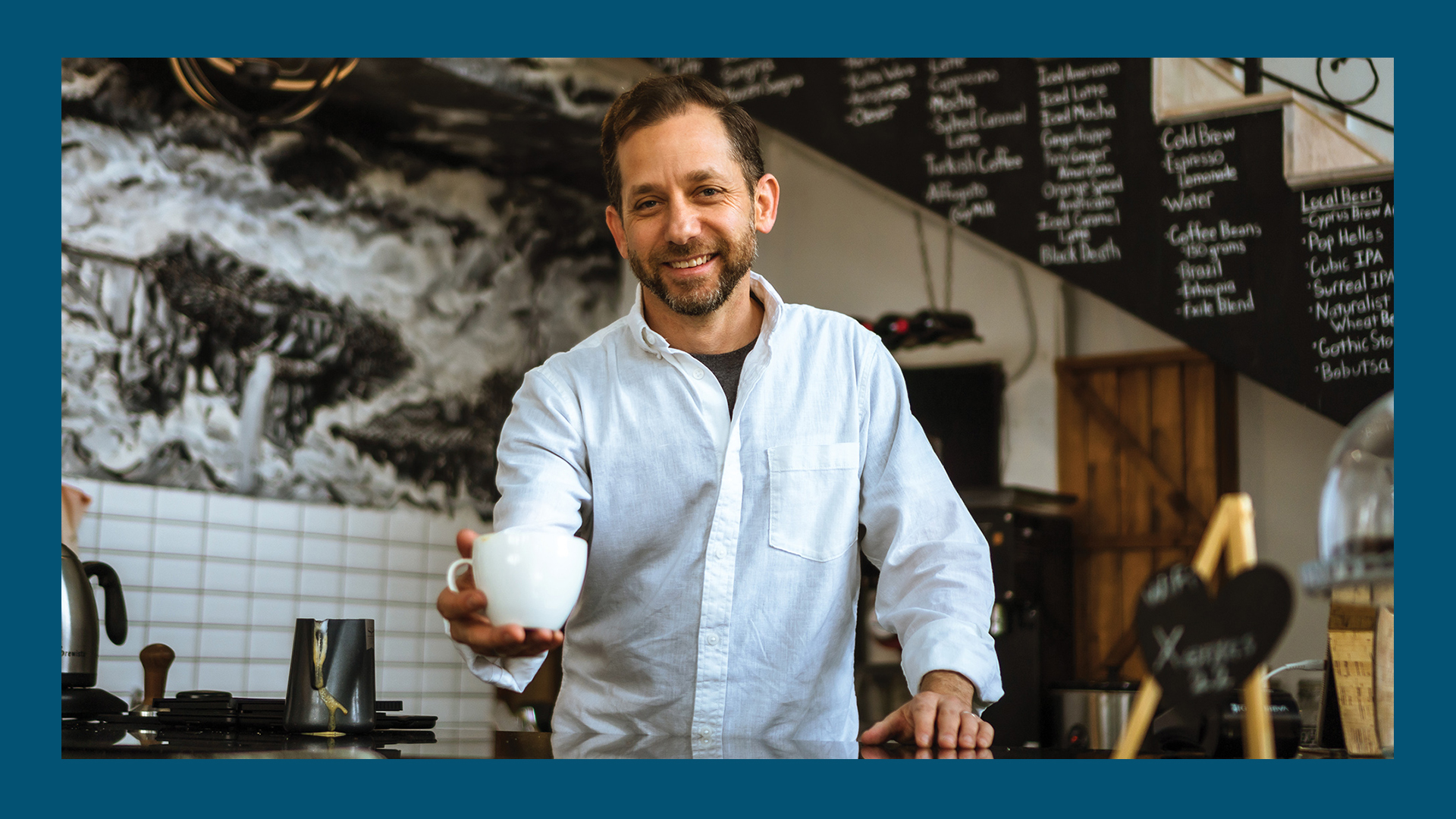This is the story about a coffeehouse.
It’s a business with a public face, with people who show up every day and make it go. It could be your local coffeehouse—perhaps tucked under awnings on a downtown street, the hum of conversation mixing with the aroma of freshly ground beans, where the barista knows your name and starts your order before you can say it.
Exile Coffee and Wine is like that, except the menu comes mixed with ministry, and big ideas percolate in the people who run it. Ryan Keating is the coffeehouse’s 47-year-old face and the catalyst behind the community that has grown up around the business in Northern Cyprus.
By morning, Keating is at the shop roasting beans or going over the day’s menu. A few hours later, you might find him up the coast at an ecotourism farm, leading a discipleship training seminar for young people from around the world, talking about creation and the work of Alvin Plantinga. By afternoon Keating is back at the coffeehouse, prepping food in the kitchen and going over the evening’s wine selection. In between, he might put on a tie for a court appearance, then take it off to help with an olive harvest. Or he might find some time to write poetry (he recently published a book of poems).
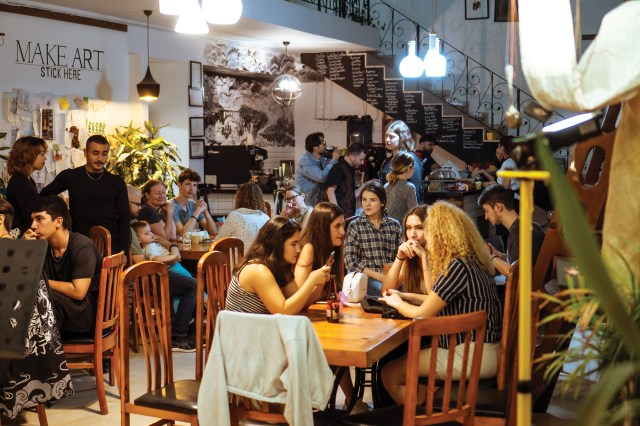 Photo by Hagin Bengo
Photo by Hagin BengoFor Keating, the 24 hours of a day seem measured by a different clock. It is as if, by sharing time in community, Keating has learned how to have more of it.
When I first visit the café it’s late in the day for caffeine, but we are cupping anyway, tasting coffee from a lineup of demitasses. Freshly made coffee breaks down into five observable parts, explains Keating—sweetness, body, acidity, flavors, and finish. We are drinking Arabica beans from Ethiopia that Keating roasted himself.
“We might pick up fruity or herbal or floral notes. Is it tarragon or black tea or bergamot, something herbal? Or sometimes it might be negative, and it could taste like grass,” he observes as we sip. (The variety we are drinking is fruity, he says.)
A slant of Mediterranean light spills over the bar top. You really can taste those things? I ask.
“It’s not about equipment, it’s just about attention,” Keating says. “It’s about paying attention to what you’re tasting and learning from other more experienced tasters. If one of them is telling me there’s tarragon or apple here, then hopefully I can taste that, and learn.”
Coffee beans can release a thousand flavor compounds when roasted, ground, filtered, and poured. An expert taster can unearth them all in one sip. The taste varies based on where the coffee is grown—the climate and altitude, for instance—and when it’s harvested. What season? What’s growing nearby? Beans generally should be roasted lightly, to preserve those delicate flavors.
It takes skill and time to learn all that the coffee is saying, and that kind of experience comes at a price. Merely paying attention doesn’t lead to automatic success. Rather, it requires patience, generosity, and knowing failure is always lurking. (Oh, you don’t pick up the apricot notes?)
Those are lessons that Keating, like many Westerners who work in Muslim-majority parts of the world, will have to learn sooner or later.
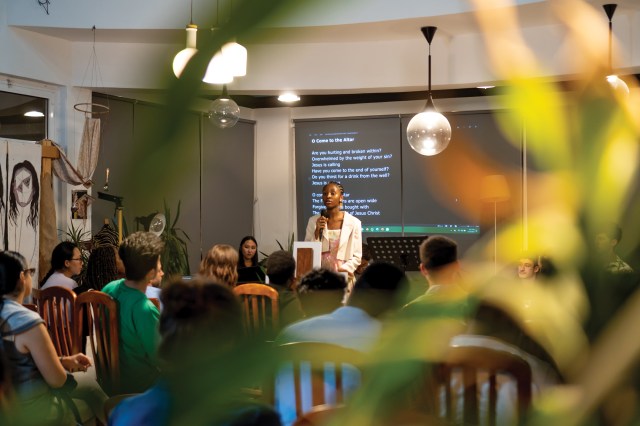 Photo by Hagin Bengo
Photo by Hagin Bengo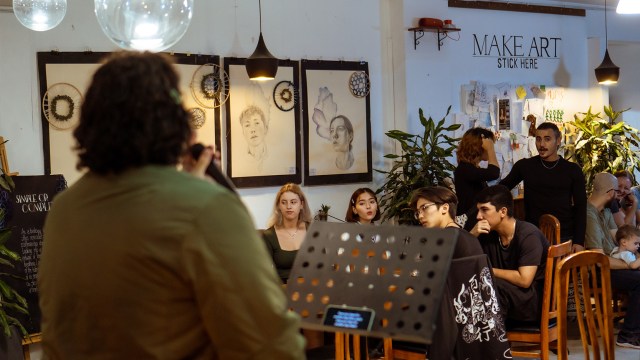 Photo by Hagin Bengo
Photo by Hagin Bengo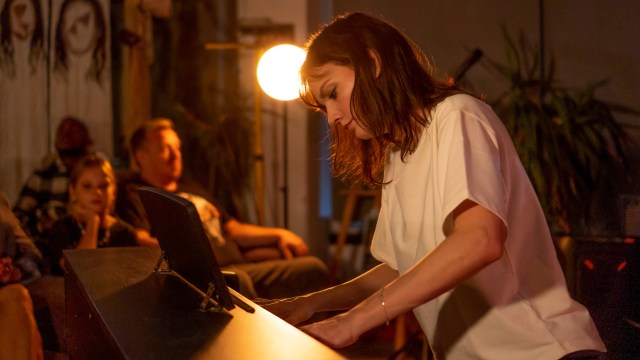 Photo by Hagin Bengo
Photo by Hagin Bengo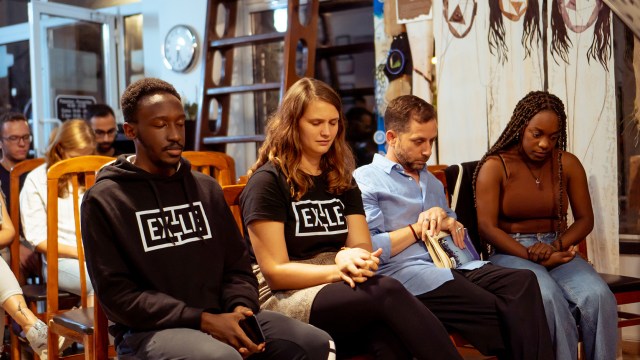 Photo by Hagin Bengo
Photo by Hagin Bengo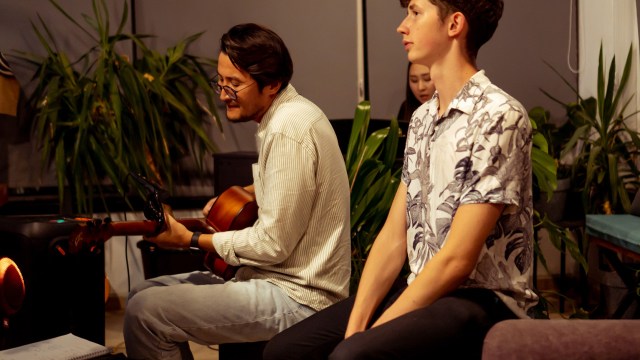 Photo by Hagin Bengo
Photo by Hagin BengoKeating discovered that coffee tasting, which he learned as a hobby while teaching and working on his doctorate in Turkey, could become a transferrable skill during years of working as a missionary—first in Turkey, and now in the divided island nation of Cyprus. It led to coffee roasting, to importing and exporting beans, to opening cafés and training others in the business.
The coffee trade fed Keating’s interest in winemaking, which led to hosting meals and to organizing events, from art shows and piano concerts to worship services and Bible studies. All the while, what the café really does is crack open ways to connect with the community.
For an American in the Middle East, that’s no small achievement.
“I love the café,” he says, “but I love it because of the way it fuels the other things I do.”
Those other things include helping to start fellowships and churches of new and old believers. They include yearly discipleship training programs that draw a small and diverse group of global participants—most in their early twenties— to Cyprus for three months.
Students learn how to think theologically while working with their hands. They spend mornings in seminars taught by Keating, among others, and afternoons working in a nearby olive grove or behind the counter at Exile. They learn to be part of the café’s community.
On Sundays, the café’s first floor turns into a worship area, hosting three distinct congregations: an African group, as well as separate English- and Turkish-language services. Keating usually preaches at one of the services. He sees to all the coffee roasting himself and usually makes food for café events. “I came into this work because I believe ministry training is incomplete if I am not modeling the sacredness of work and giving people skills,” he says.
Keating arrived in Northern Cyprus with his wife Vanessa and four children in 2017. Before that, the family lived for a decade in Turkey, where Keating joined in church planting and launched a business that included three coffeehouses in Ankara, the capital.
A century ago, Western missionaries built and staffed schools and hospitals in this part of the world as a comprehensive way to share a Christian message. Keating thinks of street-fronting businesses in the same way: A good coffee shop should employ locals, model Christian service, show hospitality, and provide a brick-and-mortar setting for other ministries.
As a 16-year-old exchange student, Keating fell in love with Turkey, a majority Muslim country that straddles Europe and Asia. He graduated from Biola University, earned a master’s degree from Yale, and returned to Turkey with Vanessa to start a ministry and a family there.
The couple’s time in Turkey was marked early by tragedy. In 2007, three friends, fellow church planters, were tied up and murdered, their throats slit by Islamic extremists who showed up at their office posing as seekers. The Malatya murders made global headlines. Keating had to help identify one of the victims.
Speaking to a gathering a year later, Keating said he learned, “Martyrdom is deadly. But it is worth it.”
He added, “People aren’t lining up to go to the hard places of the world. This is not because God isn’t calling them there. It’s because you might die there.”
His own family’s time in Turkey would come to an end in a different but also abrupt way. In 2016, authorities canceled his residency permit “for reasons of national security” while Keating was helping to plant churches, running coffee shops, and working on his PhD. The charges (which have not been dropped) came amid a nationwide crackdown on Western Christian ministries and the much-covered arrest and trial of American Andrew Brunson, forcing the Keatings to leave.
Northern Cyprus wasn’t a logical next stop. Turkey invaded the island in 1974 to prevent a Greek takeover, and the northern third, where the Keatings live, is a de facto state administered by the same Turkish government that deported him. Northern Cyprus is still not formally recognized by the United States or any country besides Turkey. A buffer zone patrolled by the United Nations divides it from the autonomous Republic of Cyprus, which occupies the rest of the island.
Despite his experience in Turkey, Keating welcomed the chance to work again among Turks. He and his family could also learn what it means to be in exile.
“I was forcibly removed from my home, yet I had lots of options that many people in exile don’t have,” he said. “I could have gone anywhere. I could have returned to America.”
After arriving in Cyprus, however, Keating found himself asking God for a clear vision for why he should stay. He began doing what he knew how to do—roasting coffee and training people for ministry. He traveled to other Turkic countries, developing ministry connections in Kyrgyzstan and other parts of Central Asia. As he got to know Africans in Cyprus, he visited Nigeria too.
Cyprus sits about 150 miles off the coast of Israel and Lebanon in the eastern Mediterranean. Even before the apostle Paul landed here on his first missionary journey, the island hummed with busy ports at the intersection of Europe and Asia. Today, it’s not unusual to track one or two US carrier groups just offshore, pulled there by nearby military conflicts. (Cyprus often morphs into a launchpad for aid to victims of wars in the region; lately it has warehoused humanitarian supplies for Gaza.) Neither is it strange to see refugees arriving by the boatload—from Iran, Iraq, Lebanon, Afghanistan, Yemen, Libya, Israel, and elsewhere.
Keating saw the importance of the divided island nation as more than a transit lounge for displaced people. He prayed for God to make Cyprus “a deep well for the blessing of the nations.” His prayer led to a new understanding about the Asians, Africans, Greeks, Turks, Europeans, and Americans living around him, he says now. It spurred a vision for recruiting young people from Central Asia, Europe, and Africa to train for ministry. The three-month discipleship course in 2023 included young people from Belarus, Germany, Sierra Leone, Uganda, Kyrgyzstan, and California.
As he watched students grow, he knew he wanted to cultivate in particular the coffee and wine businesses, “things that teach the value of time and investing in a place.”
 Photo by Hagin Bengo
Photo by Hagin BengoAlong Northern Cyprus’s coastal road—an area once home to Barnabas, the disciple who traveled with Paul—hay bales, olive trees, and low-slung farmhouses mingle among resorts built with Russian money. The only church in Northern Cyprus is one the government considers a museum, built where Barnabas is buried, just up the road from the city of Famagusta—a commercial hub with a deepwater port fronting the eastern Mediterranean.
Exile Coffee and Wine sits on a busy downtown street. The coffee bar and seating area occupy the first and second floor of a corner building that in its former life housed an online betting shop, and before that a fish market. Keating says it needed “a lot of work.”
The labors have paid off. As customers arrive in the cool of the morning, voices drift from ground-floor tables to the opened second floor, a mezzanine with additional seating. A window-lit alcove upstairs is reachable by a ladder, while an open hallway lined with shelves serves as a closet for giveaway clothes. A sign reads, “Only take 3 items, please.”
The café stays open late into the evening. Wednesday is pizza night and Friday is open mic night, a community staple. Families from the congregations that meet at the café on Sundays join unchurched twentysomethings and local students. Coworkers come for drinks and entertainment.
Exile staff pair regional wines with the menu, which Keating plans. He usually insists on making the food (lasagna, the night I was there), then advertises it on social media in English and Turkish. Audience participation is robust, and the mic stays open for hours. Musical numbers might range from an old Turkish hymn to Broadway hits and are interspersed with poetry recitations. If the electricity goes out, which is not uncommon, regulars jump up to keep the night going with light from their phones.
“We don’t have a big army of God here,” says Steve, a church team member who did not provide his last name because of security concerns. “We have yeast, a little thing, that changes from inside.”
As open mic night ends during my visit, Milad Rezapour cleans up behind the counter, giving direction to a barista-in-training from Germany. Rezapour first met Keating in Turkey, after he and his brother Hamed left Iran. His brother, like Keating, was kicked out of Turkey in 2020, and Rezapour decided to join him here.
Rezapour became a Christian in Turkey. He said he quickly felt pressure to do traditional “church work.” But “here Ryan is happy running a coffee shop and teaches us how to do all this ministry for God’s glory,” he said. “This is a big change for me. I have a job and it is for God’s glory. When I am making a drink or helping a customer, I am showing God’s glory. In Turkey I could not take my Bible in the street, but as a barista I can show God’s love and make friends.”
Helene Coleby, who’s from Germany, worked onboard a ministry ship before coming to the discipleship training program. She thought she was headed overseas to serve in missions, but as her time in Cyprus draws to a close she is thinking more about returning home. She’s feeling more confident, she says, about living as an exile, a Christian among many nonbelievers in her hometown. “I want to take the skills I’ve learned here about hospitality and community and the truth of the gospel back to a place I care about deeply.”
Others who come here for training choose to return home too, spreading the work of Exile in their own parts of the Muslim-majority world. Umed is from Dushanbe, the capital of Tajikistan, an ancient city built along a Silk Road trade route and known for its tea culture dating back millennia.
“My grandfather drank tea—green or black—but younger people drink in the coffee shops now,” he explains to me by phone.
Umed already had a coffee business of his own, started as part of a women’s ministry run by his mother. But Keating helped him professionalize it after Umed attended the discipleship training sessions in Cyprus.
“Ryan helped us grow a good coffee culture,” Umed says. “Our coffee is the best quality and he helped us with roasting, with understanding that it’s about how it smells, how it looks, and how it tastes. I can call him for help anytime.”
Umed manages the shop while his brother runs the counter and roasts the coffee beans they sell. Two thousand miles from Famagusta, Umed’s shop employs refugees and runs a kitchen like Exile. Umed and his family also work with a local church to manage shared space and ministries.
Now after a few years of pursuing his “deep well of blessing” prayer, Keating finds the work in Cyprus possibly more intense than it was Turkey: “Here we are seeding the clouds for workers in ministry.”
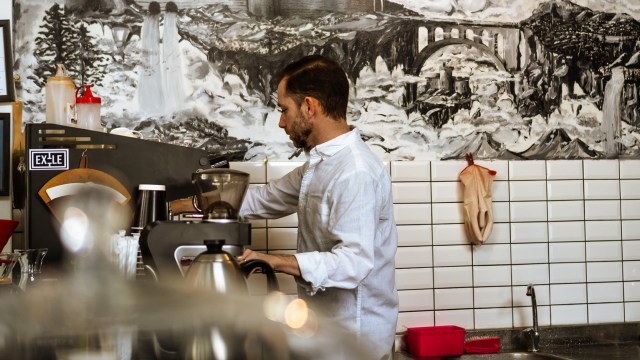 Photo by Hagin Bengo
Photo by Hagin BengoIt carries risks, too.
In 2021 local Cyprus authorities detained Keating for 11 hours while police raided the café and his home. They confiscated a box of Arabic- and Farsi-language Bibles. They released him only after friends raised $20,000 in bail by bonding deeds to their property and vehicles, including a tractor.
Local officers accused Keating of not having a license to make wine, yet Keating was able to produce licenses for operating the café and for winemaking. The Bibles were sent by a friend and used for people in his congregations, he said, but a charge of illegally importing Christian materials remains against him.
Keating makes a court appearance every month or so to hear the judge delay the case, again and again. The court continues to hold his passport, but so far a judge has been willing to release it when Keating needs to travel. He attributes the trouble to “a localized network” of bureaucrats who target foreigners and especially Christians.
Some may hope to wear him down. Keating said, “I don’t enjoy quitting and I don’t mind fighting.”
He isn’t afraid of running out of time in Cyprus either. For all his challenges, Keating sees ministry in a new way after years of learning from experience and paying attention. “The lesson of exile in the Old and New Testament is that God uses it to teach his people to seek God above all else and to love the nations. That’s what I want to impart.”
Mindy Belz is editor of the Globe Issue and former senior editor at World magazine. She reported this story from Famagusta, in northern Cyprus.

